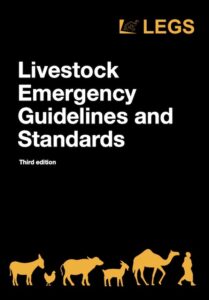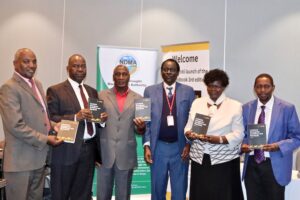The 3rd edition of the LEGS Handbook (English version) was released on 27th June 2023. To learn what’s new in this edition, watch an excerpt from our global launch webinar (full recording below). If you’re hosting an event, you can download the flyer.
The Arabic and French versions were released on 4th October 2023, and the Spanish version was released on 18th October 2023.
View the Handbook on the interactive portal.
Download a PDF copy.
Purchase a copy (or a bulk order of 20).
You can now print the LEGS Handbook locally (except in the UK, US, and Australia) – find out more.
For the first time, accompanying case studies are presented on a dedicated web page. You can also access the LEGS Impact Database to see the main documents used to develop and update LEGS.
If you’d like to hold your own LEGS Handbook launch event, click here for some guidance and resources.
The LEGS Approach
Livelihoods Objectives
LEGS is underpinned by a livelihoods approach and based on three livelihoods objectives, namely that LEGS technical interventions support crisis-affected communities to:
- obtain immediate benefits using existing livestock assets; and/or
- protect key livestock assets; and/or
- rebuild key livestock assets.
The LEGS Process
With a global scope, LEGS focuses on the process of identifying needs and analysing which interventions are most appropriate to support the livelihoods of the affected populations, at which times, and in which emergencies. Importantly, LEGS recognizes that climate change is resulting in more complex and unpredictable types of disaster.
3rd Edition Content

Nairobi launch event
In this third edition, there is greater focus on the principles that underpin LEGS, as well as step-by-step guidance on how to use the LEGS tools to develop an emergency response plan. The first three chapters focus on general principles and decision making:
- Chapter 1 introduces LEGS and provides an overview of emergencies, livestock and livelihoods.
- Chapter 2 presents the eight LEGS Principles that underpin all LEGS-based interventions
- Chapter 3 provides step by step guidance and tools for emergency response planning
The remaining chapters focus on the six LEGS technical intervention areas: feed, water, veterinary support, shelter, livestock offtake, and the provision of livestock.
Global Launch Webinar
On 28th June we held our global launch webinar. Here are the speakers and the topics covered:
- Cathy Watson – LEGS Coordinator: Introduction to the new Handbook
- Emmanuella Olesambu – Focal person for East and Southern Africa, TCE, FAO and LEGS Advisory Group member: The evidence base for LEGS and the importance of LEGS institutionalisation
- Dr. Genene Regassa – Ethiopia Country Director for VSF-Germany and LEGS trainer: Using and adapting LEGS in context
- Lubna Saeed – Community Development Officer for Brooke Pakistan: Using LEGS to support working animals
You can watch the webinar here:
Nairobi Launch Event
On 5th July, a LEGS Handbook launch event was held in Nairobi. Thank you to the lead organizers: Dr. Kisa Juma and Dr. Julis Kajume, who also served as facilitators. They were supported by Judith Nyansiaboka. Thank you also to the speakers:
- Isacc Githui – Office of the Cabinet Secretary, who delivered remarks on behalf of Hon. Rebecca Miano, MBS, Cabinet Secretary, Ministry of East African Community, Arid and Semi-Arid Lands (ASALs) & Regional Development. Read the remarks here.
- Jeremiah Kithama – Ministry of Agriculture and Livestock Development, State Department for Livestock Development (SDL)
- Harrison Atibu Mwasaru – Deputy Institutional Focal Person (IFP) for LEGS/LEGS Desk Officer for NDMA
- Dr. Rachel Masake – LEGS trainer and independent consultant
- Dr. Tabitha Njeri – Concern Worldwide
- Dr. Joseph Njuguna – FAO and previous LEGS focal point
- Piers Simpkin – LEGS Advisory Group
- Suzan Bishop – LEGS Technical and Project Manager
Our partner for the event was the National Drought Management Authority (NDMA), the new LEGS Institutional Focal Point for Kenya. Amos Nyakeyo, Deputy Director, Drought Contingency Planning and Response, is taking the lead within NDMA.
You can watch the program here:

